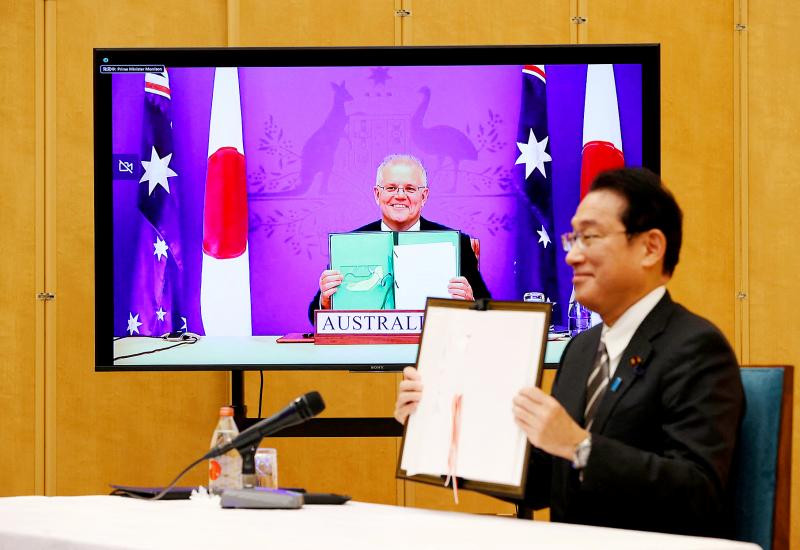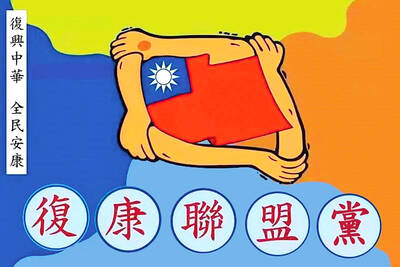Japan and Australia yesterday signed a “landmark” treaty to enhance defense ties, saying the accord would contribute to regional stability, as China expands its military and economic clout.
Although Australian Prime Minister Scott Morrison did not mention Beijing directly in a statement released ahead of the signing, the agreement is seen as another step by the regional allies to signal their concern over China’s military expansion.
Ahead of yesterday’s online summit with Japanese Prime Minister Fumio Kishida, Morrison called the agreement “a statement of two nations’ commitment to work together in meeting the shared strategic security challenges we face and to contribute to a secure and stable Indo-Pacific.”

Photo: AFP
Australia has been working with Japan, India, the UK and the US to strengthen defense ties amid concerns about China, including its pressure on Taiwan, freedom of navigation in the region and trade disputes.
The Reciprocal Access Agreement, Japan’s first with any country, would allow Australian and Japanese militaries to work seamlessly with each other on defense and humanitarian operations, Morrison said.
“Japan is our closest partner in Asia as demonstrated by our special strategic partnership, Australia’s only such partnership — an equal partnership of shared trust between two great democracies committed to the rule of law, human rights, free trade and a free and open Indo-Pacific,” Morrison said.
Kishida called the agreement a “breakthrough” and said ties with Australia would remain a model for security cooperation with other countries, a Japanese Ministry of Foreign Affairs official told a news conference.
When asked about the treaty at a regular briefing on Wednesday, Chinese Ministry of Foreign Affairs spokesman Wang Wenbin (汪文斌) said that “the Pacific Ocean is vast enough for the common development of countries in the region.”
The question of Japan’s security role is likely to figure prominently at “two-plus-two” talks today between the foreign and defense ministers of Japan and the US.
“The ministers are expected to talk about security cooperation in the region,” a Japanese Ministry of Foreign Affairs official told reporters ahead of the talks.
Although Japan maintains a “one China” policy and China is its top export destination, Tokyo’s relationship with Taipei has flourished in the past few years on a largely non-governmental basis, and there has been growing debate among politicians and security experts on whether it should get involved if China was ever to take military action against Taiwan.
Today’s talks could see the US and Japan formalize their work on a draft plan for a joint operation in the event of an emergency over Taiwan, Kyodo news agency reported.
Additional reporting by Reuters

AIR DEFENSE: The Norwegian missile system has proved highly effective in Ukraine in its war against Russia, and the US has recommended it for Taiwan, an expert said The Norwegian Advanced Surface-to-Air Missile Systems (NASAMS) Taiwan ordered from the US would be installed in strategically important positions in Taipei and New Taipei City to guard the region, the Ministry of National Defense said in statement yesterday. The air defense system would be deployed in Taipei’s Songshan District (松山) and New Taipei City’s Tamsui District (淡水), the ministry said, adding that the systems could be delivered as soon as the end of this year. The US Defense Security Cooperation Agency has previously said that three NASAMS would be sold to Taiwan. The weapons are part of the 17th US arms sale to

SERIOUS ALLEGATIONS: The suspects formed spy networks and paramilitary groups to kill government officials during a possible Chinese invasion, prosecutors said Prosecutors have indicted seven retired military officers, members of the Rehabilitation Alliance Party, for allegedly obtaining funds from China, and forming paramilitary groups and assassination squads in Taiwan to collaborate with Chinese troops in a possible war. The suspects contravened the National Security Act (國家安全法) by taking photos and drawing maps of key radar stations, missile installations and the American Institute in Taiwan’s headquarters in Taipei, prosecutors said. They allegedly prepared to collaborate with China during a possible invasion of Taiwan, prosecutors said. Retired military officer Chu Hung-i (屈宏義), 62, a Republic of China Army Academy graduate, went to China

INSURRECTION: The NSB said it found evidence the CCP was seeking snipers in Taiwan to target members of the military and foreign organizations in the event of an invasion The number of Chinese spies prosecuted in Taiwan has grown threefold over a four-year period, the National Security Bureau (NSB) said in a report released yesterday. In 2021 and 2022, 16 and 10 spies were prosecuted respectively, but that number grew to 64 last year, it said, adding that the Chinese Communist Party (CCP) was working with gangs in Taiwan to develop a network of armed spies. Spies in Taiwan have on behalf of the CCP used a variety of channels and methods to infiltrate all sectors of the country, and recruited Taiwanese to cooperate in developing organizations and obtaining sensitive information

BREAKTHROUGH: The US is making chips on par in yield and quality with Taiwan, despite people saying that it could not happen, the official said Taiwan Semiconductor Manufacturing Co (TSMC, 台積電) has begun producing advanced 4-nanometer (nm) chips for US customers in Arizona, US Secretary of Commerce Gina Raimondo said, a milestone in the semiconductor efforts of the administration of US President Joe Biden. In November last year, the commerce department finalized a US$6.6 billion grant to TSMC’s US unit for semiconductor production in Phoenix, Arizona. “For the first time ever in our country’s history, we are making leading edge 4-nanometer chips on American soil, American workers — on par in yield and quality with Taiwan,” Raimondo said, adding that production had begun in recent